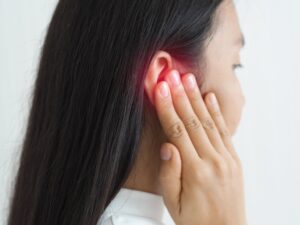How serious is a ruptured eardrum? It is painful and concerning, but it actually isn’t as serious as the words make it seem. Of course there can be complications like infections, but with care and treatment, your hearing can be preserved. Let’s learn more about causes and how to prevent a ruptured eardrum.
What Is a Ruptured Eardrum?
Also referred to as a perforated eardrum, a ruptured eardrum is when there is a tear or a hole in the tissue which divides the middle ear
Contact Coastal Ear, Nose & Throat for treatment if you develop an infection. The sooner you are examined, the sooner the issue can be diagnosed, treated, and you can expect a positive outcome.
It can also affect your sense of balance. In some cases, it can heal without any treatment, however, you may need surgical intervention to repair your damaged eardrum. Protecting your eardrum is the best way to prevent damaging it.
Signs of a Ruptured Eardrum
There are some obvious signs of a perforated eardrum which can include some of the following:
- Sudden hearing loss or if sounds are muffled
- Sudden sharp pain in your ear that quickly goes away
- Drainage from your ear that may look like blood or pus
- Tinnitus or ringing in your ears
- Vertigo or a spinning sensation
- Nausea or vomiting from the vertigo
What Can Cause a Ruptured Eardrum?
- Small objects like a hairpin or a cotton swab placed in the ear can cause a perforated eardrum. Never put anything into your ear.
- Sometimes a middle ear infection, known as otitis media, can lead to an accumulation of fluids in the ear. This pressure can create a ruptured eardrum.
- Very loud sounds or blasts can cause this to happen as well. If you are near an explosion or a gunshot, it can lead to a perforation. Wear ear protection to prevent this from occurring.
- Severe head trauma from an accident can damage the middle ear. Wear proper head gear when cycling or riding a motorcycle.
- Traveling on an airplane the pressure on the aircraft can be different from that in the middle ear. This difference in pressure can lead to a ruptured eardrum. Chewing gum helps.
When to See an ENT Specialist
A ruptured eardrum can heal on its own, but if it does not, you should see an ear, nose. and throat specialist like Coastal Ear, Nose & Throat. You can develop chronic infections and hearing loss, plus long-term vertigo. Your ENT specialist may need to do a surgical procedure to repair the perforation. Although a ruptured eardrum is normally not serious, it can become problematic if not cared for properly.
Ruptured Eardrum Care in Savannah & Pooler, GA
Contact Coastal Ear, Nose & Throat at (912) 355-2335 if you believe you may have a ruptured eardrum that is not healing on its own.
